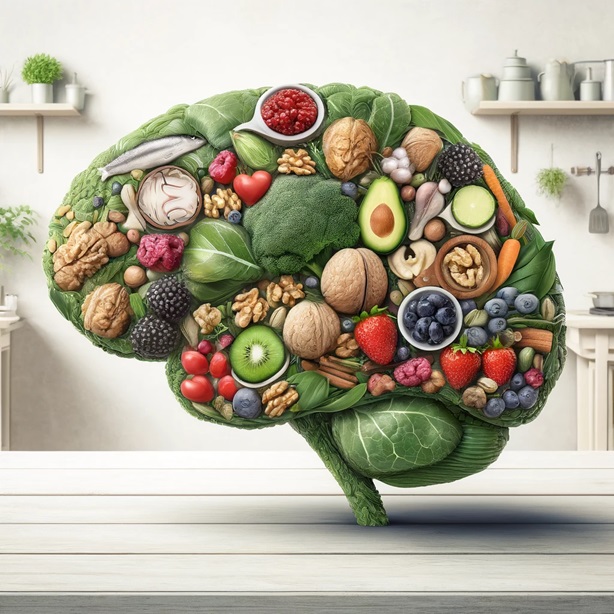The Impact of Nutrition on Brain Health

The Link Between Diet and Cognitive Function
Nutrition is the cornerstone of brain health and an essential element in maintaining cognitive function and fostering neuroplasticity. Just as a balanced diet is critical for physical health, the right nutrients can support brain structure and function. Cognitive abilities such as memory, concentration, and problem-solving are all impacted by the quality of the diet we follow.
Emerging research in nutritional neuroscience reveals that the food we consume has a profound impact on our brain health. Nutrients such as omega-3 fatty acids, antioxidants, vitamins, and minerals play significant roles in neuron function and synaptic plasticity, the foundation of learning and memory. Diets rich in these nutrients can enhance cognitive abilities and protect against neurodegenerative diseases. Additionally, poor dietary choices, such as high consumption of processed foods and sugars, have been linked to increased risk of cognitive decline and mental health disorders.
Essential Nutrients for Neuroplasticity
The brain’s ability to reorganize and form new neural connections, known as neuroplasticity, is crucial for learning and adaptation. Nutrients such as DHA, an omega-3 fatty acid found in fish oil, are vital for maintaining the fluidity of cell membranes and promoting new neural pathways. Antioxidants found in berries and leafy greens help fight oxidative stress that can damage brain cells. These nutrients contribute to a healthy brain environment conducive to neuroplastic changes.
B vitamins, particularly B12, B6, and folic acid, are involved in homocysteine metabolism and DNA synthesis, which are critical for brain health. A deficiency in these can lead to cognitive impairment and reduced neuroplasticity. Similarly, vitamin E, found in nuts and seeds, provides neuroprotective benefits due to its antioxidant properties. Magnesium, found in nuts, seeds, and leafy greens, is another important nutrient that supports cognitive function and neuroplasticity.
Incorporating a variety of nutrient-rich foods into the diet, such as fatty fish, berries, leafy greens, nuts, and seeds, can provide the essential nutrients needed for optimal brain function and neuroplasticity.
Impact of Diet on Mental Agility
Mental agility—the ability to think quickly and clearly—is greatly influenced by our diet. Complex carbohydrates, lean proteins, and healthy fats provide the energy and amino acids that are the building blocks of neurotransmitters, which are essential for brain communication. A diet that includes a variety of these macronutrients can help maintain mental sharpness and responsiveness. For example, complex carbohydrates, found in whole grains and vegetables, provide a steady supply of glucose to the brain, supporting cognitive function and preventing mental fatigue.
Furthermore, foods like turmeric and green tea, which contain bioactive compounds, have been shown to promote cognitive health and may improve mental agility. These compounds have anti-inflammatory properties that support brain function and may enhance memory and attention. Other foods, such as dark chocolate and coffee, contain caffeine and antioxidants that can improve focus and alertness, contributing to mental agility.
A diet that supports mental agility should be rich in a variety of nutrient-dense foods, while limiting processed foods and sugars that can negatively impact cognitive function.
Nutrition’s Role in Brain Recovery and Adaptation
Following injury or in the context of brain diseases, nutrition plays a pivotal role in recovery and adaptation. For example, following a stroke, increased intake of omega-3 fatty acids and antioxidants can support the brain’s repair mechanisms. These nutrients can modulate neuroinflammation and promote the recovery of neurological function. The ketogenic diet, which is high in fats and low in carbohydrates, has also shown promise in supporting brain recovery and reducing seizures in epilepsy.
In addition to aiding recovery, a nutritious diet can also prepare the brain for future challenges, enhancing its resilience. By consuming a diet that supports neuroplasticity, we can better adapt to changes and potentially delay the onset of cognitive decline associated with aging. Nutrients such as vitamin D, choline, and zinc are important for brain health and can contribute to the brain’s adaptability and resilience.
Ensuring an adequate intake of essential nutrients through a balanced diet or supplements, as needed, can support brain recovery and adaptation in the face of injury or disease.
Creating a Brain-Healthy Diet Plan
Creating a diet plan that supports brain health involves incorporating a variety of nutrient-dense foods. Aim to include colorful fruits and vegetables, whole grains, lean proteins, and healthy fats into daily meals. Hydration is also crucial, as even mild dehydration can affect cognitive function. Water, herbal teas, and hydrating foods like cucumber and watermelon can help maintain hydration levels.
While supplements can help address nutrient gaps, obtaining these nutrients from whole foods is ideal. Not only does this approach offer a synergistic blend of nutrients, but it also provides dietary fiber and other health benefits associated with whole foods. Incorporating brain-boosting foods like fatty fish, blueberries, nuts, and seeds into meals can enhance cognitive function and promote overall brain health.
It’s also important to limit foods that can negatively impact brain health, such as those high in saturated fat, sugar, and refined carbohydrates. These foods can contribute to inflammation, oxidative stress, and cognitive decline. Instead, focus on a balanced diet that provides the nutrients needed for optimal brain function and cognitive wellness.
Conclusion
Adopting dietary habits that support brain health can have a lasting impact on cognitive function and neuroplasticity. By focusing on a nutrient-rich diet and avoiding processed foods high in sugar and saturated fat, we can nourish our brains and promote overall cognitive wellness. A brain-healthy diet not only supports mental agility and resilience but also contributes to overall health and well-being.
Through mindful eating and conscious dietary choices, we can optimize our brain health and enhance our cognitive abilities, improving our quality of life and long-term brain function.